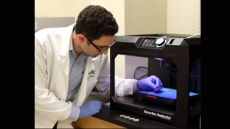A Canadian entrepreneur is stepping into a fierce global patent war as he begins to sell a hands-free "hoverboard" he believes will revolutionalize urban transportation.
Darren Pereira's Huuver company has begun to sell online its brand of self-balancing electric boards called Uuboard (the first two vowels of both names have umlauts). A Toronto dealership is in the works.
The colourful units that travel up to about 10 km/h have motors that are propelled by movements detected from sensors near the feet.
"I think it's going to change the way we move," Pereira said in an interview from Toronto.
Two gyroscopes are so sensitive they detect small shifts in balance. Lean forward and the device moves forward. Lean back and it reverses. Move to the right and it turns that way.
The technology — described by some as mini-Segways without the poles — has drawn the ire of the New Hampshire-based company that first introduced its self-balancing personal vehicle in 2001.
The subsidiary of China's Ninebot technology last week filed suit in Delaware for patent infringement against Inventist Inc., a Washington state company that sells transportation devices, including Hovertrax and Solowheel.
Ninebot said its second-generation units, launched in 2006, included patented LeanStar technology.
Inventist, however, said it has its own patents for "a two-wheel, self-balancing vehicle with independently movable foot placement sections."
It filed suit against Ninebot in China, and last June against Soibatian Corporation for their product, the IO Hawk. Billionaire Dallas Mavericks owner Mark Cuban then partnered with Inventist's founder, adding firepower to the effort to go after alleged copycats.
Pereira, however, says the legal battles won't deter him from pursuing this business opportunity.
"They could go after me but I'm about pushing public transportation," he said.
Several Chinese factories pump out thousands of units a day under various names including Oxboard, Cyboard, Future Foot, Monorover, Airboard, Freego, Esway and Overoad.
The Uuboard sells for $949 and comes with a one-year warranty, but rival products are available for between about $600 and US$1,800. Huuver's Chinese supplier, Cube Electronics Tech, said on its website they can be purchased directly for up to US$200.
While the various models look alike and carry similar features, Pereira said they're not identical. Some are a little slower, sluggish and less durable, he said.
Pereira said the Uuboard can work up to nine hours on a 135-minute charge. Weighing 22 pounds, it can carry people between 50 and 350 pounds.
The hoverboards can be used on urban bike lanes and sidewalks, but Pereira said he's been asked to put it away at a Blue Jays game and in some shopping malls.
Despite its US$1,800 price tag, the IO Hawk has had trouble keeping up with demand since it entered the U.S. market in February and attracted the attention of celebrities and athletes.
Justin Bieber, NBA all-star Stephen Curry, actor Jamie Foxx and Kendall Jenner have all been seen using the device or a slightly cheaper brand, PhunkeeDuck.
Rapper Wiz Khalifa was in the news recently when he claimed to be arrested at the Los Angeles airport for riding the device he called a "hoverboard" even though it has wheels that firmly touched the ground.





